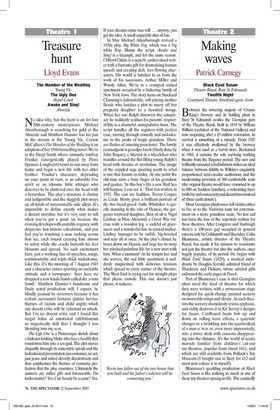Treasure hunt
Lloyd Evans The Member of the Wedding Young Vic The Ugly One Royal Court Awake and Sing! Almeida No idea why, but the hunt is on for lost 20th-century masterpieces. Michael Attenborough is searching for gold at the Almeida and Matthew Dunster has his pan in the stream at the Young Vic. Carson McCullers's The Member of the Wedding is an adaption of her 1946 bestselling novel. We're in the Deep South where romantic tomboy Frankie (energetically played by Flora Spencer-Longhurst) wants to run away from home and begin a new life with her elder brother. Frankie's character, depending on your point of view, is an adorable free spirit or an irksome little whinger who deserves to be clattered over the head with a horseshoe. The play's structure is clumsy and indigestible and the sluggish plot strays up all kinds of unreasonable side alleys. It's impossible to define exactly what makes a decent storyline but it's very easy to tell when you've got a good 'un because the evening develops with unstable urgency, with desperate last-minute calculation, and you feel you're watching a man rushing across thin ice, each bound carrying him almost to safety while the cracks beneath his feet blossom and spread. No such excitement here, just a washing line of speeches, songs, sentimentality and triple-thick melodrama. Like this. It's the morning of 7 August 1945 and a character enters sporting an excitable attitude and a newspaper: 'Says here we dropped a new kinda bomb called der a-tom bomb.' Matthew Dunster's handsome and finely acted production will, I expect, be blindly praised by reviewers because it has certain sacrosanct features (junior luvvies, themes of racism and child angst) which any decent critic will be reluctant to attack. But I'm no decent critic and I found this turgid bolus of emotional exhibitionism so majestically dull that I thought I was blending into my seat.
The Ugly One is a Pinteresque sketch about a hideous-looking bloke who has a facelift that transforms him into a sex-god. The plot moves elegantly through its concentric spirals and the lackadaisical presentation (no costumes, no set, just jeans and sofas) cleverly deconstructs and thus emphasises the themes of cosmetic perfection that the play examines. Ultimately the answers are rather glib and foreseeable. Do looks matter? Yes. Can beauty be a curse? Yes.
If your dreams come true will ... anyway, you get the idea. A small enjoyable slice of fun.
In May Michael Attenborough revived a 1930s play, Big White Fog, which was a big white flop. Blame the script. Awake and Sing! is a triumph, and for the same reason. Clifford Odets is a superb, undervalued writer with a fantastic gift for dramatising human speech and creating deft, free-flowing characters. His world is familiar to us from the work of his successors, Arthur Miller and Woody Allen. We're in a cramped rented apartment occupied by a bickering family of New York Jews. The story turns on Stockard Channing's indomitable, self-pitying mother Bessie who hatches a plot to marry off her pregnant daughter to a besotted stooge. When her son Ralph discovers the conspiracy he suddenly realises his parents' respectability is a shameful, manipulative hoax. The script handles all the registers with perfect ease, moving through comedy and melodrama to the peaks of tragic grandeur. There are flashes of amazing prescience. The family curmudgeon is grandpa Jacob (finely done by John Rogan), a Marxist in a wheelchair who trundles around the flat filling young Ralph's head with dreams of revolution. The image of the crippled sage spurring youth to rebel is one that haunts us today. At one point the old man aims a bony finger at his grandson and quakes, 'In this boy's life a new Red Sea will happen. I can see it.' That was written in 1935. The cast are faultless. Trevor Cooper as Uncle Morty gives a brilliant portrait of sly, two-faced greed. Jodie Whittaker is quietly stunning in the role of Hennie, the gorgeous wayward daughter. Best of all is Nigel Lindsay as Moe Alexrood, a Great War veteran with a wooden leg, a sackful of grievances and a wonderful line in cynical malice. Lindsay manages to be oafish, big-hearted and sexy all at once. At the play's climax he bears down on Hennie and begs her to swap her pinched pointless life for a new start with him What a moment! As he tempts her and she wavers, the sad little apartment is suddenly magnetised with delicious tensions which spread to every corner of the theatre. The West End is crying out for straight plays that please crowds. This one doesn't just please; it seduces.

































































 Previous page
Previous page